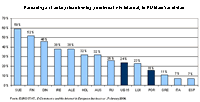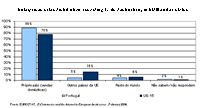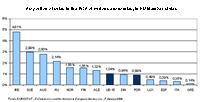The E-commerce and the Internet in European businesses report, published in February 2004 by Eurostat, presents the following main conclusions as to the situation of Portuguese enterprises regarding electronic commerce:
- About 24% of EU enterprises use e-commerce to purchase, and only 10% use it to sell;
- The engagement of Portuguese enterprises to e-commerce is a little lower: only 16% and 7% of enterprises use the Internet to make, respectively, e-purchases and e-sales;
- It is mostly in the hotel and accommodation sector that there are more Portuguese enterprises purchasing and selling online, whilst, in the EU, although it is in this sector that there is a higher proportion of enterprises via Internet, for purchases the dominant sector is services;
- Most Portuguese and European enterprises have, as main destination for their e-sales, domestic markets; Portugal seems to have enterprises with e-commerce less oriented to external markets, as compared to the EU average enterprises; and
- Enterprises in the EU generated Internet sales of 95.6 billion euros in 2001, the Portuguese enterprises accounting for about 1.15 billion euros, that is, only 1.2% of the total amount estimated for the EU.
The detailed analysis of this study enables to identify several relevant data, summarised as follows.
In spite of the improvements occurred over the last years in Portugal, the Portuguese enterprises are still behind the European average as regards e-commerce via Internet. In fact, about one fourth of the European Union (EU) companies use e-commerce to make purchases. As far as Portugal is concerned, this value doesn’t exceed 16% of companies, which makes Portugal one the EU countries with the lowest level of engagement of the enterprises to purchasing via Internet; together with Greece (with 11%), Italy and Spain, both with 7% of enterprises.
Percentage of enterprises having purchased via Internet, in EU Member-states
As to the usage of the Internet to sell, the European enterprises are, generally, less active to do so, when compared to purchase. In fact, as the graph below shows only 10% of EU enterprises use the Internet to sell. In Portugal, this value does not exceed 7%. Therefore, again, the Portuguese companies, together with the Italian ones (with 4%) and the Spanish ones (with 2%), are the ones that less use the Internet to make e-sales.
Percentage of enterprises having sold via Internet, in EU Member-states
(Click to enlarge image)
The position of the Portuguese enterprises as compared to the average of the EU enterprises is, even though, more favourable in the case of the big enterprises. The analysis made only to the enterprises that have an Internet connection, make us conclude that the big Portuguese companies show higher levels of usage of e-commerce as compared to the average of the big European companies - about 27% of the big Portuguese companies that have an Internet connection use it to make online sales, which is favourably compared to the percentage given by the average of the big European enterprises, amounting only to 17%.
As to the analysis of data per sectors of activity, it is the hotel and accommodation sector that accounts for more Portuguese enterprises making online purchases and sales. About 34% and 60% of Portuguese companies with access to the Internet that operate in this activity sector use it to make, respectively, purchases and sales. The situation for most of the enterprises in the EU Member-states is slightly different. Although it is also the hotel and accommodation sector that has a higher percentage of companies making sales via Internet (about 49%), in the case of purchases it is the service sector that leads, to which is associated a proportion of about 14% of enterprises.
From the online sales destination point of view, the data show, as expected, that the great majority of enterprises has, as main destination for its sales, domestic markets. About 89% of online sales made by Portuguese companies and 78% of sales of European companies have as destination the customers living in its own country. Portugal seems, therefore, to have enterprises who have developed a sort of e-commerce less oriented to external markets as compared to the average of EU companies - about 15% of the total amount of online sales made by EU enterprises with access to the Internet have as destination customers living in other Member-states, which is compared to only 5% of sales for the Portuguese enterprises.
Enterprises sales distribution according to its destination, in EU Member-states
Finally, and in order to have an idea of the total Internet sales in Portugal and in Europe, the estimates of Eurostat foresee that EU companies have generated Internet sales of 95.582 billion euros in 2001, the Portuguese companies accounting for about 1.146 billion euros, that is, only 1.2% of the total amount estimated for the EU. Behind Portugal there are only Greece and Luxemburg.
Proportion of sales in the GDP of various economies, in EU Member-states
However, when related to the GDP at 2002 market prices in the several European economies, Portugal has a better relative position. The Portuguese enterprises generated Internet sales in 2001 corresponding to about 0.89% of the 2002 Portuguese economy GDP, values very close to the ones that were achieved by the average EU Member-states.
Consult:
-
E-commerce and the Internet in European businesses
(PDF 1497 KB)
Related information on ANACOM's website:
- Electronic Commerce https://www.anacom.pt/render.jsp?categoryId=252364








